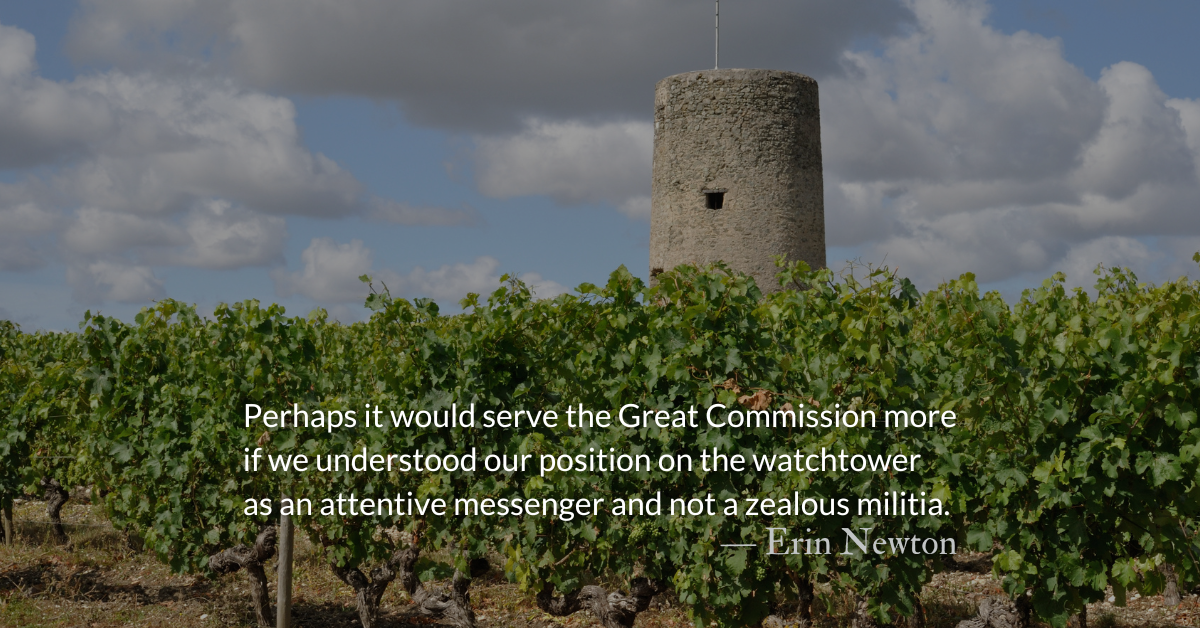Scripture Focus: Isaiah 21.6-7
6 This is what the Lord says to me:
“Go, post a lookout
and have him report what he sees.
7 When he sees chariots
with teams of horses,
riders on donkeys
or riders on camels,
let him be alert,
fully alert.”
Reflection: Be on Lookout
By Erin Newton
Ancient cities that stood a chance against an invasion were those with walls and towers. The walls were built to provide protection and watchtowers were a means of looking beyond the immediate landscape. Those on a tower could signal for help, much like the beacons of Minas Tirith in The Lord of the Rings.
Isaiah’s prophecy continues to describe impending disaster. The vision of judgment returns to Babylon though she had been the center of prophecy earlier. This time, God commands Isaiah to send someone to the watchtower to wait for a sign. The lookout was to stay alert, fully alert.
What was the lookout expecting to see? Signs of chariots and horses, people coming from distant lands. The fall of Babylon had been prophesied and they awaited the confirmation, “Babylon has fallen!”
Isaiah preached to his defeated brethren. Exile awaited them. Israel longed to see the fulfillment of the prophecies against their enemies. Yet, the person on the tower was not directing armies. They had to sit by and wait.
What does it mean to be fully alert? In this instance, it is not a call to arms. It means an attentiveness to what is going on around them. It means watching for God to work. To be alert is to be undistracted by the world.
The New Testament continues this call to be alert. Jesus told his disciples to watch and pray in Gethsemane. Peter failed to stay alert but was more than eager to defend Jesus when Judas betrayed him.
Some Christians with a vigilante spirit confuse the call to alertness with a call to arms or a declaration of war. The New Testament is not calling us to be ready to defend our Savior with a sword.
However, there is the call to stay alert for the return of Christ. But those who are alert will be dressed in battle gear unlike any military uniform. “But since we belong to the day, let us be sober, putting on faith and love as a breastplate, and the hope of salvation as a helmet” (1 Thessalonians 5.8).
Most often, alertness is linked to prayer. It is the same command from God to Isaiah and Jesus to his disciples. Watch and pray. Perhaps it would serve the Great Commission more if we understood our position on the watchtower as an attentive messenger and not a zealous militia.
Divine Hours Prayer: The Call to Prayer
Love the Lord, all you who worship him; the Lord protects the faithful, but repays to the full those who act haughtily. — Psalm 31.23
Today’s Readings
Isaiah 21 (Listen -2:32)
Luke 3 (Listen -5:24)
Read more about The Sword Versus The Cross
They might wave a “Jesus” flag, but they want to be saved by less demanding things. Many want to be saved by the sword.
Read more about Of Pride and The Sword
In scripture the sword is not inanimate. The sword is hungry, with an appetite to devour individuals, races, nations, kings, and empires.








